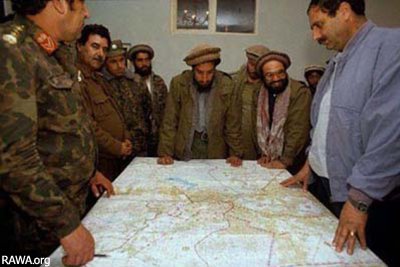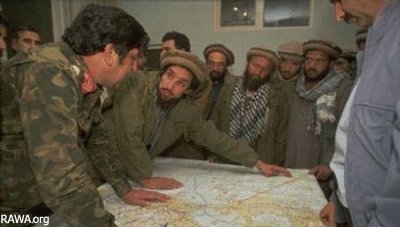The News International, May 17, 2001
BUREAU REPORT
PESHAWAR: General Gramov, commander of ex-soviet invading army in Afghanistan, has revealed that present leader of the Northern Alliance in Afghanistan Ahmad Shah Masoud had inked an agreement with Moscow that ensured safe passage to the former USSR troops through Salang and Panjsher valleys during the Afghan jihad.


Ahmad Shah Massoud, Qasim Fahim and other commanders of Shura-e-Nezar with Parchami (Russian puppets regime) army generals Nabi Azimi, Noor-ul-Haq Ulomi, Asif Delawar and others.
According to an Afghan journalist Sami Yusafzai, General Gramov has exposed many facts about the 10 years-long Soviet involvement and Afghan resistance movement in his took "Soviet Army in Afghanistan".
He reveals that when the first Russian troops left Hairatan on Afghan-Uzbek border for Kabul via land route in 1980, the soviets feared that the passage of the army through Salang valley and high peaks of Panjsher valley which were manned by the mujahideen of Ahmad Shah Masoud was not only difficult but also almost impossible. The army of famed Jihadi commander Ahmad Shah Masoud, Gramov said, could convert the area into graveyard for the Russian troops by only throwing rocks.
Gramov says at that critical time the then Khad chief Dr. Najibullah acted very shrewdly and contacted Ahmad Shah Masoud who demanded direct talks with the Russians. The Soviet General says they immediately met Masoud and signed an agreement with him that ensured safe passage of Russian army through the dangerous Salang and Panjsher valleys and thus onward to the southern, central and eastern Afghanistan.
General Gramov says Ahmad Shah Masoud in return continued to get Russian assistance. He says Masoud sometimes used to stage sham skirmishes with the Russian to put off chances of suspicions about his activities among other mujahideen groups. He says the Soviets feared that Masoud would use the agreement for dishonest gains but he acted on the accord and avoided creating problems for the Russian army till its withdrawal in 1998.
Gramov says differences between Ahmad Shah Masoud and Gulbuddin Hikmatyar dated back to their days at engineering faculty of Kabul University when both were members of an Islamic student organization. He says that besides being a high caliber military commander who never stayed for two days at a place, Masoud had a political mind.
The Persian-speaking Afghans, Gramov says, consider Masoud as their leader and hero. Mining and export of the precious stones at Panjsher, he says, is major source of income for Masoud. He says Masoud had especial links with France where the press has helped him earn world fame. Gramov says Masoud leads his life in accordance with Islamic principles but according to Russians' reports he used to take liquor in the company of his close friends.
Gramov further says that on the one hand Masoud had an agreement with the Russians for safe passage at Salang pass and on the other his military council Shura-i-Nazar, fought with them on many fronts in northern Afghanistan and killed many Russian troops.
General Gramov says that in case of hard times his armies could contact the mujahideen in northern Afghanistan and struck a deal on the based of some give and take. However, he says in the eastern and southern Afghanistan where the Pukhtun were in majority such incidents were rare.
Gramov says the Russian invasion of Afghanistan was a blunder that led to the disintegration of the Soviet Union.
Los Angeles Times, April 26, 1999
By DEXTER FILKINS
In 1975, at the age of 22, Masoud led a revolt--later known as the Panjsher Valley Incident--aimed at toppling the regime. Most of his colleagues landed in jail, but Masoud made a narrow escape--his first of many. After receiving military training in Pakistan, Masoud returned to Afghanistan in 1978.
….
In 1983, Masoud agreed to a temporary cease-fire with the Soviets, who were then free to attack other areas. To this day, some of Masoud's old rivals express deep bitterness at his dealings--which may have kept him alive but made their lives much worse. "Masoud deceived everyone," said a former commander of the moujahedeen, or holy warriors.
The American spy who headed the CIA's efforts against the Soviet Union in Afghanistan credited Masoud with impressive military feats. But he added that, in the later years of the war, Masoud spent most of his time preparing for the coming civil war--not fighting the Communists. "He was not that reliable," said Milton Bearden, the CIA's station chief in Pakistan during the war. "Toward the end, he spent most of his energies on consolidating his own position." Masoud said he agreed to the 1983 cease-fire to buy time to build up his forces. Barnett Rubin, an Afghanistan expert at the Council of Foreign Relations in New York, said Masoud spent the year setting up a vast political organization across northern Afghanistan. "Masoud was a very effective leader and a very effective fighter," said a former CIA agent, who spoke on condition of anonymity. "One of the criteria of an effective fighter is, you don't pick fights you can't win." Masoud led the final drive into Kabul in 1992 and became defense minister in the new government. Shooting broke out among the moujahedeen almost immediately. The fighting, which lasted four years, destroyed Kabul and killed tens of thousands of Afghans. Thousands more were maimed, raped and robbed.
… in one terrible incident in 1993, documented by the State Department, Masoud's troops rampaged through a rival neighborhood, raping, looting and killing as many as a thousand people.